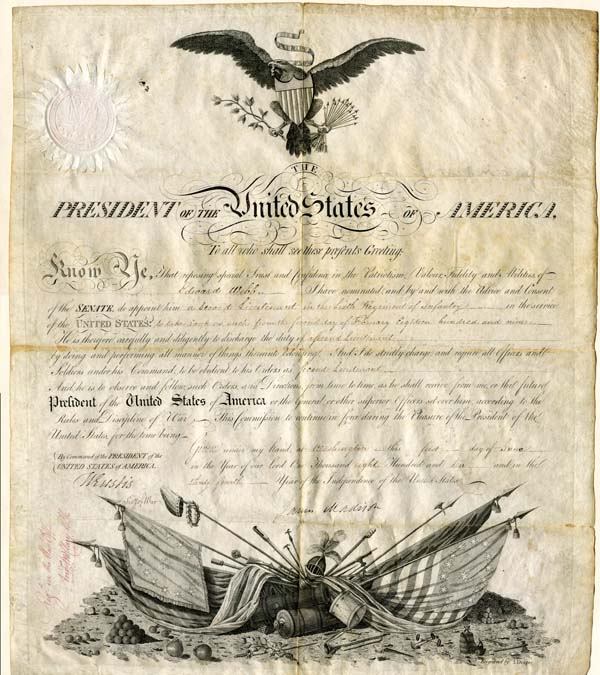James Madison signed Military Commission
Inv# AU1136
James Madison, Jr. (March 16, 1751– June 28, 1836) is the “Father of the Constitution” and the author of the Bill of Rights. He has been called the chief architect of the most important political experiment in human history.[citation needed] George F. Will once wrote that if we truly believed that the pen is mightier than the sword, our nation’s capital would have been called “Madison, D.C.”, instead of Washington, D.C. Madison also wrote over a third of the ‘’Federalist Papers’’, which was a series of 85 newspaper articles, which were published throughout the 13 states, and explained to the public how the proposed Constitution would work. Thomas Jefferson referred to the ‘’Federalist Papers’’ as “the best commentary on the principles of government, which ever was written”. They are still the primary source today for jurists and legal scholars interested in the original understanding of the Constitution. James Madison was also the fourth president of the United States. As with Thomas Jefferson, his most significant contributions to American history came before his presidency. The Constitution is the world’s oldest written constitution, and is considered to be the most important document ever written in the history of freedom.The Constitution has been a model for other constitutions around the world ever since, and many of them read remarkably like America’s Constitution. Madison served in the first Congress under the new Constitution, and was considered to be the expert on the Constitution. George Washington frequently sought out Madison’s advice on the Constitution and matters of precedent. As Jefferson’s Secretary of State (1801-1809), Madison supervised the Louisiana Purchase, doubling the nation’s size. As president, after the failure of diplomatic protests and an embargo, he led the nation into the War of 1812, in response to England’s impressment of American seamen. Despite going up against a superpower of the day (England), and being a young nation without much of a military, America did better than might have been expected in this war.[citation needed] Despite the American Revolution, England had been treating America as if it were still a colony. After successfully standing up to England, in this war, which as been called a second war for independence, celebrations resounded throughout America. Americans felt that their nationhood and honor had been vindicated, and a new era of growth, trade and prosperity began. Madison's most distinctive belief as a political theorist was the principle of divided power. Madison believed that "parchment barriers" were not sufficient to protect the rights of citizens. Power must be divided, both between federal and state governments (federalism), and within the federal government (checks and balances) to protect individual rights from the tyranny of the majority. Although blocked by his foes from the Senate he became a leader in the new House of Representatives, drafting many basic laws. In one of his most famous roles he drafted the first ten amendments to the Constitution and thus is known as the "Father of the Bill of Rights". Madison worked closely with the President George Washington to organize the new federal government. Breaking with Treasury Secretary Alexander Hamilton in 1791, Madison and Thomas Jefferson organized what they called the Republican Party (later called by historians the Democratic-Republican Party) in opposition to key policies of the Federalists, especially the national bank and the Jay Treaty. He co-authored, along with Thomas Jefferson, the Kentucky and Virginia Resolutions in 1798 to protest the Alien and Sedition Acts. James Madison signs this Military Commission appointing Edward Webber a Second Lieutenant in the 6th Regiment of the Infantry. Measures 15 3/4" x 18 1/2".










Ebay ID: labarre_galleries